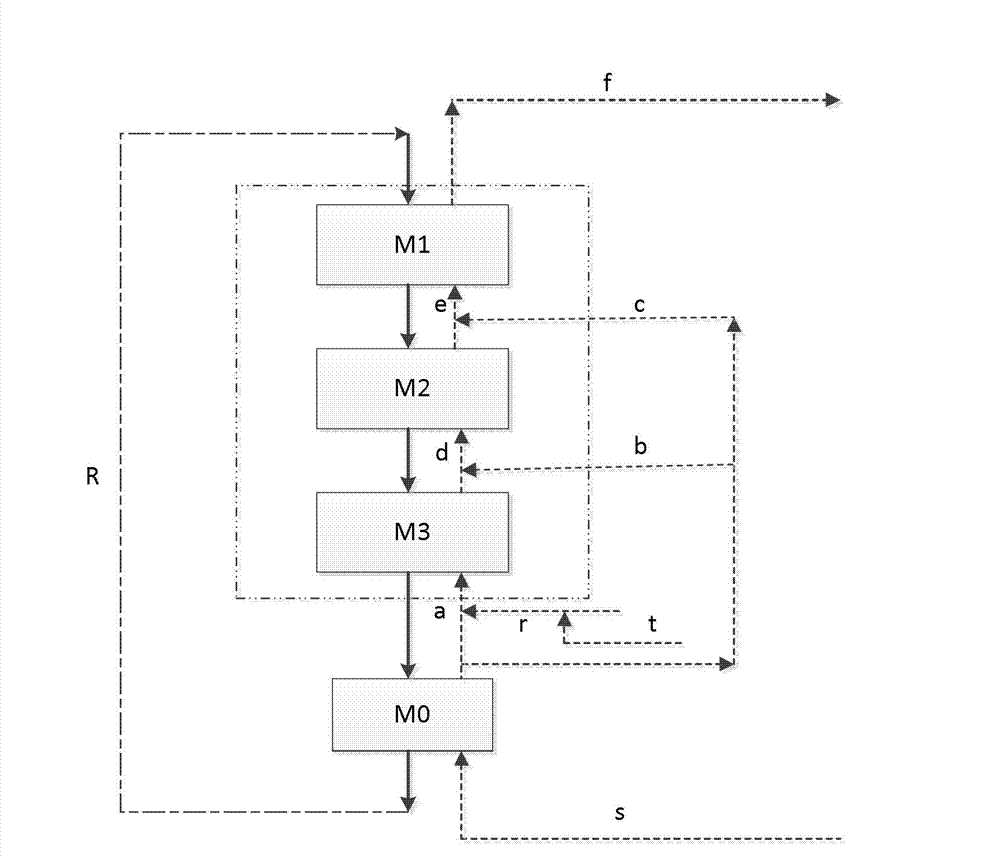Production technique of propylene
A production process, propylene technology, applied in ethylene production, bulk chemical production, biological raw materials, etc., to achieve the effect of reducing sensitivity, slowing down the severity of carbon deposition, and reducing heat removal load
- Summary
- Abstract
- Description
- Claims
- Application Information
AI Technical Summary
Problems solved by technology
Method used
Image
Examples
Embodiment 1
[0043] The catalyst used in this example is a ZSM-5 molecular sieve spherical catalyst with a particle size of 1.5mm-2mm, and the raw material used is methanol.
[0044] The etherification reaction zone adopts a moving bed reactor, the inlet temperature is 200°C, the operation is under normal pressure, and the mass space velocity of methanol is 20h -1 .
[0045] The OTP reaction zone adopts two moving bed reactors, the inlet temperature of the first moving bed reactor is 450°C, operated under normal pressure, and the mass space velocity of methanol is 10h -1 ; The inlet temperature of the second moving bed reactor is 450°C, operated under normal pressure, and the mass space velocity of methanol is 10h -1 ;
[0046] The intermediate quench liquid is a mixture of dimethyl ether, methanol and water produced by etherification reaction, the molar ratio of the diluent to the primary product is 3, and the diluent is water.
[0047] Transport the fresh catalyst without coke to the ...
Embodiment 2
[0051] The catalyst used in this example is a ZSM-5 molecular sieve spherical catalyst with a particle size of 1.5mm-2mm, and the raw material used is methanol.
[0052] The etherification reaction zone adopts a moving bed reactor, the inlet temperature is 230°C, it is operated under normal pressure, and the mass space velocity of methanol is 4h -1 .
[0053] The OTP reaction zone adopts four moving bed reactors, the inlet temperature of the first moving bed reactor is 470°C, operated under normal pressure, and the mass space velocity of methanol is 2h -1 , the other three are the same; the intermediate shock liquid adopts the mixture of dimethyl ether, methanol and water produced by the etherification reaction, the molar ratio of the diluent to the primary product is 10, and the diluent is water.
[0054] The catalyst with 10% carbon content is sent to the first moving bed reactor, and during the reaction, it moves to the second to fourth moving bed reactors in turn by gravi...
Embodiment 3
[0058] The catalyst used in this example is a ZSM-5 molecular sieve spherical catalyst with a particle size of 1.5mm-2mm, and the raw material used is methanol.
[0059] The etherification reaction zone adopts a moving bed reactor, the inlet temperature is 250°C, the operation is under normal pressure, and the mass space velocity of methanol is 1h -1 .
[0060] The OTP reaction zone adopts six moving bed reactors, the inlet temperature of the first moving bed reactor is 480°C, operated under normal pressure, and the mass space velocity of methanol is 0.5h -1 , the other five are the same; the intermediate cold shock liquid adopts mixtures such as dimethyl ether, methanol and water produced by etherification reaction, the molar ratio of the diluent to the primary product is 20, and the diluent is water.
[0061] The catalyst with 1.5% carbon content is transported to the first moving bed reactor, and during the reaction, it moves to the second to sixth moving bed reactors in t...
PUM
 Login to View More
Login to View More Abstract
Description
Claims
Application Information
 Login to View More
Login to View More - R&D
- Intellectual Property
- Life Sciences
- Materials
- Tech Scout
- Unparalleled Data Quality
- Higher Quality Content
- 60% Fewer Hallucinations
Browse by: Latest US Patents, China's latest patents, Technical Efficacy Thesaurus, Application Domain, Technology Topic, Popular Technical Reports.
© 2025 PatSnap. All rights reserved.Legal|Privacy policy|Modern Slavery Act Transparency Statement|Sitemap|About US| Contact US: help@patsnap.com

